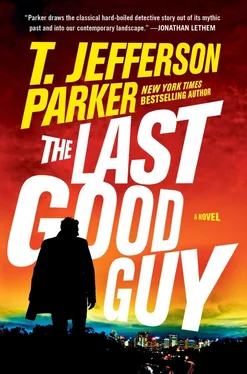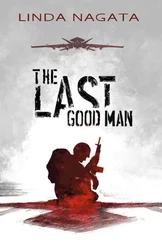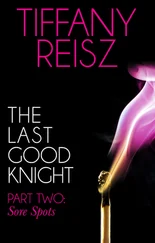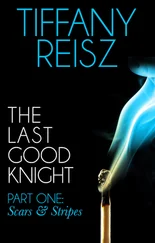“How about we trade numbers? If you see her again I expect a call from you.”
Jake gave me his number and I logged it into my phone, then sent my number to his phone as a text. A beat later, I heard the chime from within the green backpack.
He dug some sunglasses from his pack and slipped them on. “She in trouble?” he asked.
“I think so.”
“Does it have to do with your shaving accident?”
“To be honest, yes. Call me if you see her, please.”
“Not a problem. She’s for sure got a boyfriend, right?”
“I don’t think so, Jake.”
He smiled. We shook hands. His felt as cold as mine had just a few short days ago.
Burt and I came to the security fence around the plant, standard chain link, twelve feet high. No razor wire at the top, no electricity to shock curious surfers, swimmers, fishermen, sunbathers, or dogs. But still the end of the trail for citizens such as us.
From there the domes loomed higher. Some of the buildings had been demolished and taken away and an air of uselessness hung over the plant. The deconstruction cranes stood at rest here on Sunday, their latticed booms unmoving in the blue.
The only sign of life was plant security, the heavily armed guards that Jake mentioned. I watched a pair of guards patrolling the southern side of the station, automatic rifles slung over their shoulders, fat sidearms, ammunition, batons, and pepper spray on their belts. Desert camouflage uniforms. Another two emerged from a cluster of buildings, strolling casually toward the western perimeter of the complex.
About halfway along the western flank of the compound, a couple of Jeeps came side by side, with two more armed guards in each. Burt waved as they came down the road past us. I chose to look away. Watched a surfer catch a very nice left, barrel along, nothing fancy, just an honest longboard run.
When the guards were well past us, I popped the question.
“SNR Security, right?”
“Indeed,” said Burt. “And such friendly men. They waved back.”
“They just made up my mind about what to do next,” I said.
“Try me.”
“What good can come of a fourteen-year-old girl, her homicidal pals at SNR Security, a date farm where they beat visitors, and a decommissioned nuclear power plant?”
“No good at all,” said Burt.
“I want you to find a way into Paradise and take a look around. I’d do it myself, except...” I pointed at my own face.
“I’ve been thinking about that, too. And I have some ideas.”
We stopped and looked at each other. “I don’t mean to sound wimpy, Burt, but it’s pretty fucking unfriendly down on that farm.”
“So I see.”
We continued down the beach.
“But,” said Burt, “I also see that this doesn’t have to be our problem. Who are you, Roland? You are an employee. You have seen your job site now and it is a formidable place. Those apes at Paradise could have killed you out there. They probably should have. I would guess that more than one of them thought it might be the prudent thing to do, put you down nice and deep and far away, like we did to our troublesome friend not long ago. So here you are, alive and breathing. What I’m saying is, is this job of yours worth it? Is the girl worth your life? Mine?”
I’d been wondering the same. Soldiers and cops put their lives on the line. It’s part of the job. A private investigator doesn’t have to. You can save your own skin anytime you want. No court-martial or internal investigations. You can even call the cops and let them do the dirty work. However, a PI can take on risk. And the amount of risk changes with what you think about your clients. I’ve had clients I wouldn’t jaywalk to help. And others I’ve taken a beating for.
“She’s fourteen,” I said. “And in the company of murderers.”
Burt looked down at the sand, nodded, as we walked along. “Between the feds, the state, and the county, there are thousands of people dedicated to finding runaways like Daley Rideout.”
“Yet some of those runaways still show up dead, or never.”
Human silence then, just the crash of waves and the cries of seagulls and the soft crunch of our feet on the sand. The ocean blue now, not green. Shadows lengthening west to east, evening coming on.
“Then, of course, there’s the sister.”
“Yes,” I said. “There she is.”
“I’m sure you want to come through for her.”
“I really do.”
“I can see why,” Burt agreed. “She’s responsible for the girl. Very much on the hook. And quite an eyeful, too. All those curves and curls.”
“She has my attention.”
“I saw it in your postures at the picnic table. How you walked her to her car.”
“None of you were exactly subtle.”
“Friends aren’t subtle.”
“It’s like catching something.”
“Slow to win, Roland. It’s a saying in sports.”
“I know what it is.”
“I’m not worried,” said Burt. “You’ll notice things in her that will slow you down. It’s easy to fog things up with your own breath.”
We continued past the power plant a few hundred feet, then turned around and headed back toward my truck. Strange to walk past all those eighteen hundred tons of nuclear waste buried in the sand just a few yards away. While you check out the surf, and think about your work, and about a woman you barely know and who has lied straight to your face and you still can’t close your mind’s eye on her.
“Now, so far as Paradise goes,” said Burt, “I’ve printed maps we can use. There’s an adjacent BLM parcel that Paradise doesn’t own — dirt roads, occasional bird hunters and rock hounds. I’ll be inside. You’ll be able to keep an eye on me. I talked to our friend Clevenger. He’s made some cameras we can have. You’ll like these.”
When we got back home, I was surprised to find the Irregulars and Penelope Rideout arrayed around the picnic table under the big palapa, apparently deep into cocktail hour.
Sundays are ceviche night at Rancho del los Robles. I gathered that Penelope had arrived earlier, unannounced, then honked from the gate until Dick had let her in. When Penelope saw the festivities shaping up, she’d offered to fetch the ceviche from our usual source, Rosa’s Restaurant downtown. Thereby earning an invite to stay for dinner. She sat between Dick and Liz, one of Liz’s “industrial-strength” margaritas in a stemmed balloon glass before her.
Penelope wore a summer dress on this summer evening — periwinkle, I believe the color is called. Hair up on one side, held by a flowered comb. Her white phone sat on the table in front of her.
They had saved me my place at one end of the table. I sat and hefted one of the two large pitchers of margaritas, poured away. A festive paper tablecloth and mason-jar candles, faintly fragrant.
Inspired by the drinks, Violet launched into a story of seeing her first and only bullfight in Tijuana a few years back — a novillada , or novice contest, that was particularly sickening if you were pulling for the bull, which she was. She had been furious at her date for bringing her to such a pointlessly gruesome spectacle and had broken up with him before they’d reached their Tijuana hotel, where she had then moved her things into a separate room, and the next day taken the Amtrak Surfliner all the way from Imperial Beach home to Santa Barbara.
“I thought you were living in St. Louis,” said Liz.
“Exactly,” said Violet, smiling. “But I was staying with friends in Santa Barbara that summer and I had to get away from that guy as fast as possible! And I still remember the name of the bullfighter who was the big draw that day — Adan Coreas. There are so many things that I’d like to forget, but once they get into my head...”
Читать дальше












